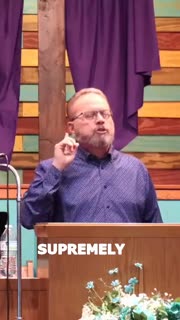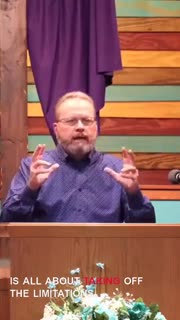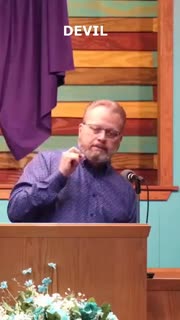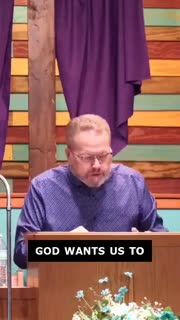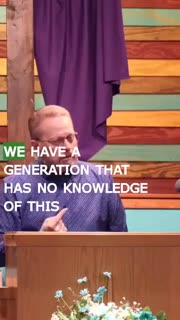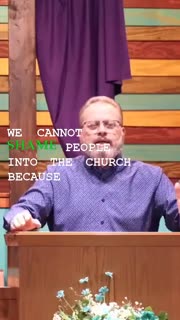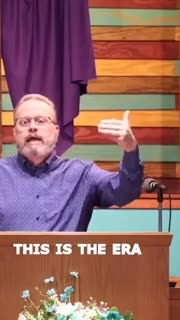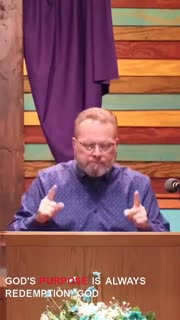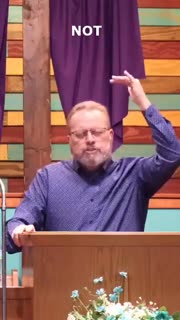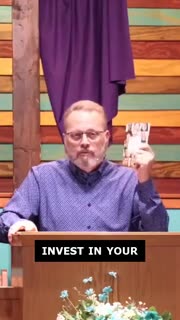Embracing God's Grace: Breaking Boundaries in Ministry
Devotional
Sermon Summary
Bible Study Guide
Sermon Clips
1. "God is so supremely secure in his plan. When he comes to you and asks you to do something, you can know he's already prepared the way. He's already made a plan. And so you don't have to stress over it. God, how is this going to happen? Don't fret over it. Don't worry about it. I got it all taken care of. See, God lives in the future. He lives in the past and he lives in the present all at the same time." [19:21] (28 seconds)
2. "God is all about taking off the limitations. He doesn't want us to keep him. God is not the God of the box. He's not the God that stays in his boundaries. Okay. He doesn't color inside the lines. Okay. God doesn't obey our rules. So that's why we can't say, okay, this is the way it is and it can't be any other way. We have got to keep our mind available." [21:44] (32 seconds)
3. "The devil cannot create anything. The devil can't create anything because he's not a redeemed being. He is a fallen creature and we'll talk about this when I start, I'm going to start a series on worship and we'll talk about that the first time. We'll talk about how he was created but he is a created being. He is a created being but has fallen so he cannot create anything. He can taint things, he can twist things, he can turn things but he cannot create anything." [24:02] (30 seconds)
4. "God wants us to understand the era of the sheet has come. Now, Paul in this time, and this is kind of what got me. Because Wednesday at Bible study, we were talking about, we were in Romans chapter 3, and we were talking about this and we read this passage. I'm going to read this chapter 3, verses 9 through 18. Paul says, what then? Are we better than they? Not at all. So he's explaining to the Jews because he's saying the Gentiles don't have to do, keep the Jewish laws." [28:52] (29 seconds)
5. "We have a generation that has no knowledge of this right here. No knowledge of serving God. Why? Because it was never introduced. Their parents were forced to go to church by their parents. And so they said, I'm not raising my kids that way. And so their kids were involved in baseball select league and all this kind of stuff. And they went to the, they had boats and they had to go fishing. They have to do all this. So they work. I work all week. Saturday, I have to get stuff done around the house. Sunday is my day. And we're going to go have fun." [34:13] (34 seconds)
6. "We cannot shame people into the church because they don't have that inside of them that, oh, I ought to get in church. You know, back in the day when people started having kids, they thought, you know, we might as well get into church because we ought to raise our kids. We ought to get back in church. Well, that's not there anymore. So those kind of things, those expectations that we have of people are not there anymore. Because it's a totally different generation in society than we used to have." [43:21] (24 seconds)
7. "This is the era of the sheet. This is the era of the time when things that we used to not condone. We're not going to connect ourselves with. It's time that God says, I want you to connect with that now because I have called it. I'm redeeming that. I'm redeeming that. Now, is that food any better for you because God is clean? I don't know, but it's really good stuff. I'm glad pork chops are available now. I'm glad ribs. Last Sunday I partook in pork." [43:21] (31 seconds)
8. "God's purpose is always redemption. God is always redemptive in his purposes. So it's the era of the sheet. We're talking about our eras. We've gone through different eras in the church, and this is the era of the sheet. What used to be things that we didn't hang around, the people we didn't associate with, God is saying, don't call them unclean anymore. Because see, God loves them." [54:40] (31 seconds)
9. "God does not love what they're doing, but he loves them. I have certain sensitivities that once people step on those, I get repulsed. I mean, I see people do things, and I go, ugh, yuck. But God does that, but he doesn't turn away from them. God is repulsed by what they do, but he never turns away. Thank God he didn't turn away from me because I was a two-faced preacher boy being all kinds of hypocritical. He never turned away from me, and I thank God he didn't. I'm so grateful he didn't turn away." [58:34] (42 seconds)
10. "We want to invest in your new life. We want to invest that. If you're in the house, we've got some on the altars up front. You can come and take one. In fact, we need to put some back on that back table there so people that are heading out can take them. But we want to sow that into your life. And don't let us ... Give us your information. We want to stay connected with you. We want to help you. We want to help you in this journey, okay?" [01:04:29] (21 seconds)
Ask a question about this sermon
2. "God is all about taking off the limitations. He doesn't want us to keep him. God is not the God of the box. He's not the God that stays in his boundaries. Okay. He doesn't color inside the lines. Okay. God doesn't obey our rules. So that's why we can't say, okay, this is the way it is and it can't be any other way. We have got to keep our mind available." [21:44] (32 seconds)
3. "The devil cannot create anything. The devil can't create anything because he's not a redeemed being. He is a fallen creature and we'll talk about this when I start, I'm going to start a series on worship and we'll talk about that the first time. We'll talk about how he was created but he is a created being. He is a created being but has fallen so he cannot create anything. He can taint things, he can twist things, he can turn things but he cannot create anything." [24:02] (30 seconds)
4. "God wants us to understand the era of the sheet has come. Now, Paul in this time, and this is kind of what got me. Because Wednesday at Bible study, we were talking about, we were in Romans chapter 3, and we were talking about this and we read this passage. I'm going to read this chapter 3, verses 9 through 18. Paul says, what then? Are we better than they? Not at all. So he's explaining to the Jews because he's saying the Gentiles don't have to do, keep the Jewish laws." [28:52] (29 seconds)
5. "We have a generation that has no knowledge of this right here. No knowledge of serving God. Why? Because it was never introduced. Their parents were forced to go to church by their parents. And so they said, I'm not raising my kids that way. And so their kids were involved in baseball select league and all this kind of stuff. And they went to the, they had boats and they had to go fishing. They have to do all this. So they work. I work all week. Saturday, I have to get stuff done around the house. Sunday is my day. And we're going to go have fun." [34:13] (34 seconds)
6. "We cannot shame people into the church because they don't have that inside of them that, oh, I ought to get in church. You know, back in the day when people started having kids, they thought, you know, we might as well get into church because we ought to raise our kids. We ought to get back in church. Well, that's not there anymore. So those kind of things, those expectations that we have of people are not there anymore. Because it's a totally different generation in society than we used to have." [43:21] (24 seconds)
7. "This is the era of the sheet. This is the era of the time when things that we used to not condone. We're not going to connect ourselves with. It's time that God says, I want you to connect with that now because I have called it. I'm redeeming that. I'm redeeming that. Now, is that food any better for you because God is clean? I don't know, but it's really good stuff. I'm glad pork chops are available now. I'm glad ribs. Last Sunday I partook in pork." [43:21] (31 seconds)
8. "God's purpose is always redemption. God is always redemptive in his purposes. So it's the era of the sheet. We're talking about our eras. We've gone through different eras in the church, and this is the era of the sheet. What used to be things that we didn't hang around, the people we didn't associate with, God is saying, don't call them unclean anymore. Because see, God loves them." [54:40] (31 seconds)
9. "God does not love what they're doing, but he loves them. I have certain sensitivities that once people step on those, I get repulsed. I mean, I see people do things, and I go, ugh, yuck. But God does that, but he doesn't turn away from them. God is repulsed by what they do, but he never turns away. Thank God he didn't turn away from me because I was a two-faced preacher boy being all kinds of hypocritical. He never turned away from me, and I thank God he didn't. I'm so grateful he didn't turn away." [58:34] (42 seconds)
10. "We want to invest in your new life. We want to invest that. If you're in the house, we've got some on the altars up front. You can come and take one. In fact, we need to put some back on that back table there so people that are heading out can take them. But we want to sow that into your life. And don't let us ... Give us your information. We want to stay connected with you. We want to help you. We want to help you in this journey, okay?" [01:04:29] (21 seconds)
